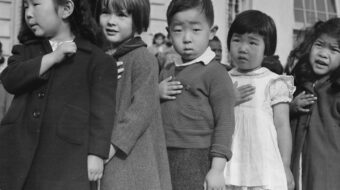
LOS ANGELES – Gruesome Playground Injuries (GPI) traces the relationship between eight-year-old schoolmates throughout the course of the next thirty years, but in zigzagging time frames, its eight scenes showing them at the following ages: 8, 23, 13, 28, 18, 33, 23, 38. Along the way they experience the usual stages of personal development – first kisses, loss of virginity, early loves, competitive vomiting, attempts at holding down a job, drugs, hospitalization, parents’ funerals.
The play proceeds without intermission, with pauses in between scenes only long enough to accommodate the actors changing clothes and makeup. At each age, Doug suffers some horrible calamity – his mother claims he’s “accident prone” – that begs for Kayleen’s attention and pity. She too has much in her life that she literally cannot stomach. At one point (scene 6, age 33), they meet in rehab.
Presented as a dark comedy, GPI pulls the scabs off all the ways we hurt ourselves and then seek relief from pain – often by inflicting more damage. We see two emotionally troubled characters who are simultaneously drawn to one another and also repelled. Doug seemingly comes from a loving, balanced family, Kayleen not so much: Who can say why some people are cursed with such bad psychological luck?
The author is 41 year-old Rajiv Joseph, American born of an immigrant father from India, which no doubt accounts for the Indian or Middle Eastern setting for several of his works, though not this one. He is best known for his plays Animals Out of Paper, The North Pool, Bengal Tiger at the Baghdad Zoo (a Pulitzer Prize finalist which starred Robin Williams in its New York production), and Guards at the Taj. His libretto for the opera Shalimar the Clown by composer Jack Perla, based on the novel by Salman Rushdie, debuts on the Opera Theatre of Saint Louis stage on June 11th.
I have only seen Guards at the Taj, in a stunningly effective – and far more gruesome – production at the Geffen Theatre in Los Angeles. That work is premised on the conceit that the raja who commissioned the Taj Mahal ordered the hands cut off from all the workmen who built it, so that there would never be another creation of such beauty in the world. The play positively swims in bloody limbs, which does take some time getting comfortable with, but the reward is Joseph’s profound contemplation of themes of duty and obeisance, order and freedom, art and the price we pay for it, with ample dollops of gallows humor thrown in as leavening.
GPI was written in 2009 and soon came to the attention of Sara Rae Foster, who describes it as “a wildly popular play” that “has stood the test of time” – perhaps a little hyperbolic for a work not yet a decade old. It seems to have been principally her project to perform in this work and get it staged. The two-hander stars Ms. Foster as Kayleen and Jeff Ward as Doug. Foster has appeared on Showtime’s “Masters of Sex” and TNT’s “Mob City.” Ward recently played Charles Manson in the original Lifetime movie “Manson’s Lost Girls.”
Director John Hindman introduces GPI talking about the walls that we build, the defenses we erect, and how, just maybe, love and time help to bring them down – “in the case of this play, maybe as long as thirty years.”
Running about an hour and a half, GPI is a tour de force for the two actors who must stumble through just about every life-sucking experience known to the modern world. They do so with admirable versatility and range.
The simple but highly utilitarian stage design is by J R Bruce. Little tables and benches and flats serve to hold the various costumes and props the actors will use over the course of their eight scenes. Projections show grainy clips of children and young people at happier times and introduce the next time frame.
The tagline to the play – “It hurts because it matters” – is vague. Yes, the hurt matters to Kayleen and Doug, and that’s the content and essence of the work. But does it matter to their families? Not much evidence of that. Their friends? We don’t even know if they have any. To us? After eight scenes of nervous, shuddering laughter at other people’s angst, I couldn’t help wishing for some larger meaning, a broader social relevance, some door leading into the world out there. It’s a hothouse romance, or what the French call a “folie à deux” – a madness for two – that we don’t easily relate to from the perspective of our (presumably) more stable lives.
And yet there are indications of caring, healing and love between these two, slender reeds on which to hang our hopes for these characters.
Rajiv Joseph is unquestionably one of the currently most admired and produced playwrights in America, an artist I intend to follow more closely. In his creative arc GPI may not rank as his most significant achievement, but it’s extremely well done and holds a viewer’s interest.
Gruesome Playground Injuries plays through June 26 on Fridays & Saturdays at 8 pm and Sundays at 3 pm at the Hudson Backstage, 6539 Santa Monica Blvd., Los Angeles 90038. Tickets may be obtained at www.plays411.com/playground or (323) 960-7773.
Photo: Sara Rae Foster and Jeff Ward / Ed Krieger

MOST POPULAR TODAY

Zionist organizations leading campaign to stop ceasefire resolutions in D.C. area


High Court essentially bans demonstrations, freedom of assembly in Deep South

Afghanistan’s socialist years: The promising future killed off by U.S. imperialism

Communist Karol Cariola elected president of Chile’s legislature






Comments